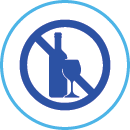Esophageal cancer
Esophageal cancer is a cancer that develops in the lining of the esophagus i.e. the food pipe that runs from your throat to your stomach. It can grow through the wall of the esophagus and can spread to other parts of the body through the lymphatic system(other vessels through which lymph drains from the tissues into the blood). There are two main sub-types of the disease :
- Squamous Cell Cancer is a tumour that grows with squamous cells and form the surface of the skin and lining of hollow organs in the body.
- Adenocarcinomas is a malignant tumour which grows in the areas to the bottom of the esophagus, and where the esophagus joins the stomach that are lined with columnar cells.
Studies have shown a relationship between frequency of reflux symptoms and risk of adenocarcinoma. The constant acid reflux irritates the lining of the esophagus, and complications can occur, such as Barrett's esophagus. Individuals who develop Barrett's esophagus are about 40 times more likely to develop esophageal cancer than individuals in the general population.

Symptoms
- Heartburn
- Difficulty swallowing
- Inability swallowing solid foods (eventually liquids also)
- Pain with swallowing
- Food sticking in esophagus
- Weight loss
- Regurgitation of undigested food
- Vomiting blood or passing old blood with bowel movements
When To
See Doctor
At the early stage esophageal cancer displays no signs or symptoms as such. However, if you have consistent signs or symptoms as mentioned above make an early appointment.
If you have been diagnosed with Barrett's esophagus, consult your doctor to watch out for signs and symptoms that can trigger & worsen the condition.
Risk Factors
Continuous irritation of the esophagus can increase the chances of cancer. Some of the irritants that cause these risks are:

GERD

SMOKING

TOBACCO

OBESITY

BILE REFLUX
